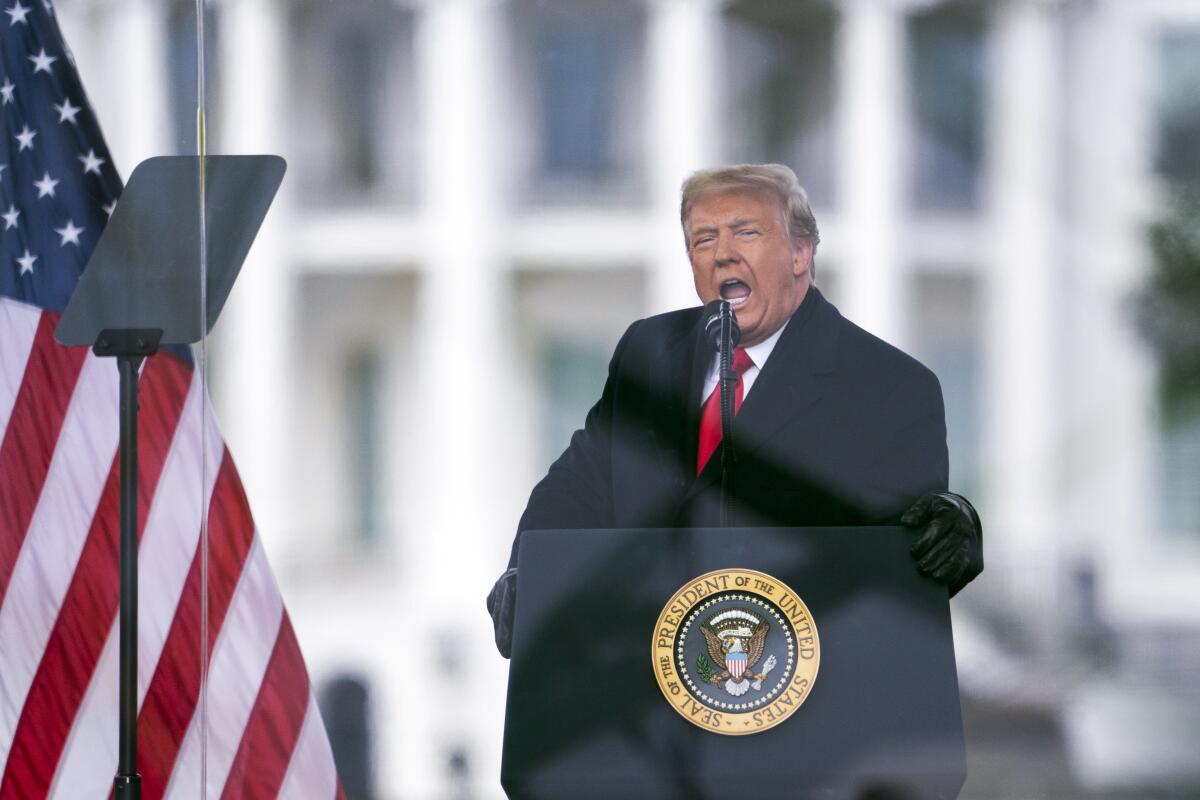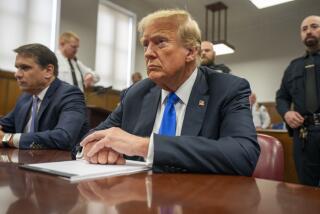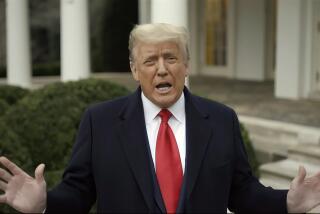Column: Did the DOJ just say Donald Trump can be held accountable for Jan. 6? Well, kind of

The Department of Justice on Thursday filed a brief with a reassuring bottom line for those who yearn for accountability for Donald Trump. The department concluded that the former president may be sued for damages to the extent his public speech constituted incitement to imminent, private violence — in this case, the Jan. 6, 2021, storming of the U.S. Capitol.
It’s the same test the courts have developed to distinguish expression protected by the First Amendment from actionable or criminal provocation. If it’s accepted by the appellate court, which solicited the department’s view, it would mean that plaintiffs — including Capitol Police officers and members of Congress, among them California Reps. Eric Swalwell and Barbara Lee — can seek monetary damages from Trump in a civil lawsuit.
That’s the encouraging news. Below the headline, however, the department offered a hedged and tentative analysis with the potential to complicate other cases against Trump.
The department’s conclusion is preceded by a series of warnings against holding a president liable for his conduct in office. The department repeatedly emphasizes the unique “complexities of the president’s role in our constitutional system.” It advises the court that his liability can be considered only “with the greatest sensitivity to the complex and unremitting nature of the president’s office and role.” It stresses the need to protect the president from having to be “unduly cautious” in exercising his official functions.
For these reasons, wrote the department, the proper analysis does not turn on the question of a president’s motives; the court should just consider the objective effect of his conduct. Likewise, the court shouldn’t try to separate the president as campaigner from the president as officeholder, a pivotal distinction according to the plaintiffs.
All this qualification matters because the factual distinctions the department rejects could play a crucial role in the many civil and criminal cases swirling around the former president.
The DOJ brief has a footnote disclaiming any view regarding the president’s criminal liability. Yet the analysis on the civil liability question could have repercussions for efforts to hold the ex-president criminally accountable unless the department articulates explicitly different views on criminal liability.
The DOJ is a highly compartmentalized place, and the brief shows unmistakable signs of a delicate compromise between the gang that defends a broad view of presidential powers and the prosecutors, such as special counsel Jack Smith, who want to be able to hold Trump accountable for criminal conduct. The unanswered question is whether the department will recommend a different analysis for alleged criminal conduct.
Suppose a court were to adopt the DOJ line that it should not consider a president’s motives in assessing immunity. How might that play out in prosecutions that turn on evidence of the president’s mental state? An actual prosecution of Trump for strong-arming Georgia’s secretary of state, for example, would necessarily rely on evidence that he had an improper motive — that is, throwing out legitimate votes — not some legitimate presidential interest in enforcing voting rights.
And what about the DOJ’s advice that the courts should be very cautious about distinguishing between conduct undertaken as part of a president’s official duties and his conduct as a candidate for reelection? The Trump team’s false-elector schemes and pressure campaign against Vice President Mike Pence were plainly driven by his unscrupulous campaign to “win” an election he had lost. None of that seems to deserve protection as part of his presidential duties, but the Justice Department suggests that at least in a civil context, it’s too difficult to draw that line.
Trump’s motives in all the Jan. 6 schemes, and his status as a candidate scratching and clawing to stay in office improperly, are at the heart of what puts his conduct well outside his official duties and makes the cases worthy of prosecution.
Perhaps the DOJ will be able to argue that allegations of criminal conduct are different because crimes are more plainly outside the president’s responsibilities. But Trump is certainly preparing to counter any indictment with an argument that he is immune from prosecution. This week’s brief avoids taking a stance on the criminal issue, but the day will come when that question is unavoidable.
Let’s hope that once forced off the fence, the department will take the only position that squares with Atty. Gen. Merrick Garland’s insistence that “no one is above the law”: Trump’s conduct represented the very antithesis of his official responsibilities and does not merit immunity under any plausible standard.
Harry Litman is the host of the Talking Feds podcast. @harrylitman
More to Read
A cure for the common opinion
Get thought-provoking perspectives with our weekly newsletter.
You may occasionally receive promotional content from the Los Angeles Times.











